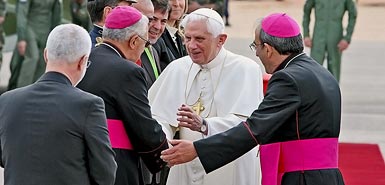By Richard Owen
The Times
May 12, 2010
http://www.timesonline.co.uk/tol/comment/faith/article7124373.ece
 |
| Richard Owen in Lisbon |
The Pope today warned priests against “activities which do not fully accord with the ministry of Christ” after he arrived at Fatima, one of Christianity’s most popular shrines, on the second day of his four-day visit to Portugal.
The Pope did not refer specifically to the clerical sex abuse crisis engulfing the Church, as he had on the plane to Lisbon from Rome. However, he warned the clergy to pay “particular attention to a certain weakening of priestly ideals”.
On the plane to Lisbon the Pope admitted that “sins inside” the Catholic Church were entirely responsible for the child abuse scandal that has spread across Europe.
In his most strongly worded condemnation of the priests involved in paedophile cases the pontiff said: “Today we see in a truly terrifying way that the greatest persecution of the Church does not come from enemies on the outside but is born from the sins within the Church.
“The Church needs to profoundly relearn penitence, accept purification, learn forgiveness but also justice.” Vatican officials have sought to blame the abuse scandal on a supposed conspiracy by the media, freemasons and pro-abortion and pro-gay marriage lobbies.
The pontiff’s pilgrimage to Fatima, 120km (75 miles) north of Lisbon, is the highlight of his visit. He will hold an open air Mass for half a million people tomorrow at the shrine, the “Lourdes of Portugal”, which receives 5 million pilgrims a year, many of whom approach it on their knees.
The Mass will mark the anniversary of the day in 1917 when three Portuguese shepherd children — Lucia Santos, 10, and her cousins Jacinta and Francisco Marto, aged 9 and 7 — claimed that as the sun “spun in the sky” they saw several visions of the Virgin Mary, who confided three secrets to them.
Ten years ago John Paul II beatified Jacinta and Francisco, who died young and are buried at the shrine. Lucia Santos, who became a nun, died five years ago and is also buried at Fatima. She, too, is headed for beatification, the step before sainthood.
The First and Second Secrets of Fatima, published in the 1940s, were interpreted as foreseeing the Second World War and the conversion of Communist Russia to Christianity. The Third Secret, only disclosed during John Paul’s 2000 visit to Fatima, predicted the attempt on his life on May 13, 1981, describing him as a “bishop in white” cut down in a hail of gunfire.
There are persistent reports that another part of the Third Secret, predicting the collapse of the Catholic Church in apostasy, was suppressed. The Vatican denies this.
In Lisbon the Pope said that the Third Secret predicted the suffering not only of Popes, but also of the Church, of which the sex abuse crisis was part. However, he added, “the resurrection of Christ assures us that no adverse power will ever be able to destroy the Church”.
After his short helicopter ride to Fatima from Lisbon the Pope prayed in front of the statue of the Madonna at the Chapel of Apparitions, in whose crown is embedded the bullet that nearly killed John Paul in 1981. He attributed his survival to the “miraculous intervention” of the Virgin Mary.
In Lisbon thousands of wellwishers lined the Pope’s route and attended an open air mass near the Tagus. However, hundreds of protesters against the Vatican’s refusal to sanction the use of condoms as a way of fighting HIV and Aids handed out free contraceptives.
Before leaving Lisbon today the Pope met leading Portuguese cultural figures, including the 101-year-old filmmaker Manoel de Oliveira.
Up to 90 per cent of Portuguese people call themselves Roman Catholics, but less than one third attend Mass regularly. President Anibal Cavaco Silva is expected next week to sign into law a Bill that will make Portugal the sixth European country to permit gay marriage.
Portugal’s centre-left Socialist Government legalised abortion in in 2007.
In Lisbon the Pope criticised the abortion law, saying that officials must give “essential consideration” to issues that affect human life. “The point at issue is not an ethical confrontation between a secular and religious system, so much as a question about the meaning that we give to our freedom,” he said.
In contrast to his visit to Malta three weeks ago, when he met victims of sex abuse and prayed with them, few sex abuse allegations have so far emerged in Portugal.
At his Lisbon Mass the Pope said that Portugal “has gained a glorious place among the nations for the service rendered to the spreading of the faith: in all five continents there are local churches that owe their origin to Portuguese missionary activity.
“Today, as you play your part in building up the European community, you offer the contribution of your cultural and religious identity.”
Any original material on these pages is copyright © BishopAccountability.org 2004. Reproduce freely with attribution.